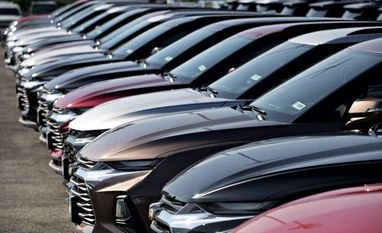The flat sales of passenger vehicles (PVs) in the first half of 2024-25 came as a “slight surprise” for the automobile industry, but it is expecting a rebound in the second half due to the festival season, Shailesh Chandra, President, Society of Indian Automobile Manufacturers (SIAM), said on Monday.
Chandra said that the PV industry is expected to post a growth of “sub 5 per cent” in financial year 2024-25 (FY25).
SIAM revealed on Monday that in the H1 of FY25, the domestic wholesales (dispatches to dealers) of PVs recorded a marginal increase of 0.53 per cent year-on-year (Y-o-Y) to 2.081 million units.
“The triangulated view at the beginning of the fiscal year was 5-8 per cent growth. The expectation for H1 was slightly better. It was a slight surprise, especially May and June, which did not go as per our expectations. May and June affected us badly,” said Chandra, who is also the Managing Director of PV and electric vehicle (EV) divisions of Tata Motors.
“The sales went up in September but then they were offset by the shraddh period. H2 now has a big burden. That is why we expect sub-5 per cent growth in FY25,” he explained.
He mentioned that the high base effect is the prominent reason behind the flat sales in H1.
More From This Section
“The high base is the main reason. Last year, the industry recorded 4.2 million units annual sales. The demand is strong and that is why the domestic sales remain at that level. Generally, at a CAGR (compounded annual growth rate) level, the growth rate of the industry is similar to the level of GDP. So, it should be 6-8 per cent (just like GDP) in the coming years,” he noted.
When asked about the high level of inventory with automobile dealers, he replied, “Typically, in Q2, the inventory levels are higher as a build up to the festive season. However, we (SIAM) do not have an industry wide inventory number.”
“Q2 of any financial year sees the inventory build-up in the industry. Wholesales in Q2 are higher. Q3 is the high retail period and it observes lower wholesales. In the first 15 days of this month, we are seeing a 35 per cent month-on-month growth in retail sales,” he added, expressing optimism about good growth in H2 of 2024-25.
Electric car sales have been decreasing for the last several months. Tata Motors is the leading player in the EV market with almost 70 per cent share.
Chandra explained the reasons for the downturn.
“Whenever there is a new technology, the effect of industry’s growth or downturn magnifies. So, if the industry is seeing a small downturn, it magnifies in the case of the new technology,” he stated.
“Fleet sales were a big part of the EV sales. It was too high last year. It has gone down this year. There is an impact of that. Road tax has been taken away in two states. That has also impacted,” he stated.
However, with more models from more companies coming, this will change, he stated. “The trend of growth will come back,” he asserted.
He mentioned that there has been no effect yet on the industry’s supply chain or production due to the geopolitical crisis in West Asia.
The domestic sale of passenger vehicles (PVs) decreased by 1.4 per cent Y-o-Y to 356,752 units in September, as per the SIAM data released on Monday.
However, the domestic sale of two-wheelers in the country increased by 15.8 per cent Y-o-Y to 2.025 million units in September, the data mentioned.
In the H1 of 2024-25, the domestic sales of two-wheelers increased by 16.3 per cent Y-o-Y to 10.16 million units.
)